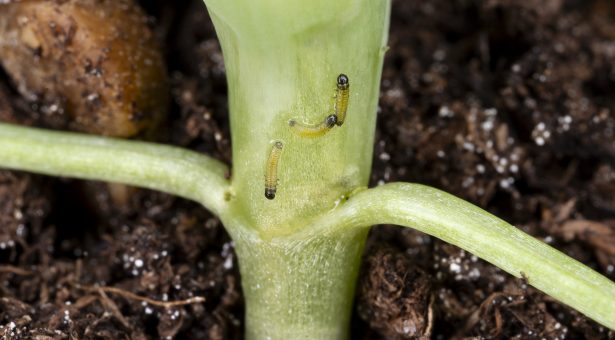Combatting Cabbage Stem Flea Beetle

Within the UK, Cabbage Stem Flea Beetle (Psylliodes chrysocephala) is a significant pest of oilseed rape.
Cabbage Stem Flea Beetle (CSFB) has been known to cause yield losses of up to 20%, with some growers even choosing to plough in the crop if the damage caused is too great. The crop losses caused by this pest have increased since the withdrawal of neonicotinoid-based pesticides, which were previously used as seed treatments for oilseed rape to control the beetle.
As a result of the crop losses, there has also been a reduction in the amount of oilseed rape being grown in the UK. Between 2012 and 2019 the UK cropping area of oilseed rape reduced by 35%, which has led to questions over the future of this crop in the UK.
Feeding preferences
To combat this pest, work is underway by Dr Rachel Wells and team to understand feeding preferences of cabbage stem flea beetles as part of a research programme to identify material that is resistant to, or at least more tolerant of, cabbage stem flea beetle damage. The John Innes Centre has an outstanding Entomology Department, which has enabled the very first in house breeding population of cabbage stem flea beetle to be developed. This is an extremely useful tool, enabling year-round access to a species which is only present in the field twice a year.
Research into the feeding preferences of adult beetles has identified huge variation in palatability across genotypes, and two oilseed rape lines have been identified which are less palatable to the adult flea beetle.
Future Impact
Researchers have now moved to screening material for larval resistance. CSFB larvae are stem miners. They are active throughout the winter and can cause significant yield penalties and in severe cases lead to plant death. Finding material resistant to the larvae, will help to reduce the effects of this pest.
With a better understanding of the ecology and evolution of the beetle, and how it interacts with oilseed rape, we hope this research will help to reduce the impact of CSFB for growers by providing information about varieties that are less palatable to flea beetle or more tolerant to flea beetle damage. Furthermore, we hope this research will provide markers for use by plant breeders in the development of new varieties that are resistant to this significant pest. This should in turn result in an increase in oilseed rape yields and help to maintain and expand the use of oilseed rape as a valuable break crop in the UK.
